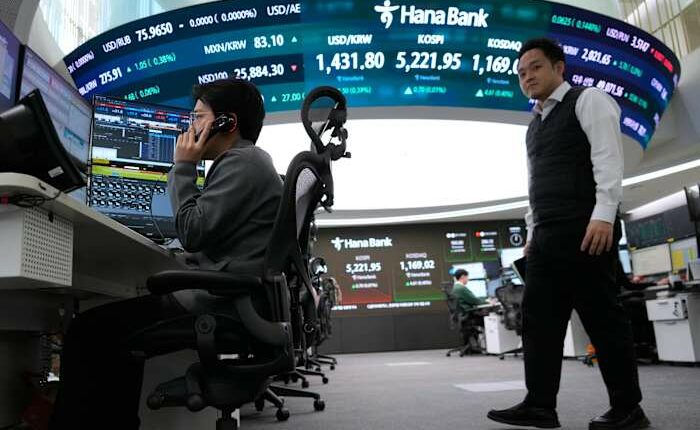Share this @internewscast.com

Monday saw a sharp decline in U.S. futures and Asian shares, accompanied by a significant drop in oil prices, which fell more than $2 per barrel. The market turbulence extended to South Korea, where the Kospi index plummeted by 4.6%, closing at 4,982.54. This downturn was largely driven by renewed concerns over a potential bubble within the artificial intelligence sector. Major players like Samsung Electronics and SK Hynix were not spared, with Samsung sliding 3.5% and SK Hynix dropping 5.6%.
In recent weeks, the Kospi had been on a record-breaking streak, buoyed by the tech industry’s enthusiasm for AI, with companies like Nvidia striking significant deals that fueled investor optimism. However, Monday’s market movements suggest a shift in sentiment, as investors reassess the sustainability of such rapid gains.
Elsewhere in the commodities market, gold prices dipped by 1%, while silver managed to climb over 2%, rebounding from substantial losses on Friday that interrupted their record-setting performance. These fluctuations in precious metals indicate a volatile trading environment, as market participants respond to broader economic signals.
Adding to the market’s unease, investors are closely watching developments in the U.S. Federal Reserve. President Donald Trump’s nomination of Kevin Warsh to lead the institution has sparked speculation about potential shifts in interest rate policies. This uncertainty contributed to a 0.9% decline in futures for the S&P 500 and a 0.5% drop for the Dow Jones Industrial Average.
In the energy sector, U.S. benchmark crude oil experienced a substantial decline, losing $2.80 to settle at $62.41 per barrel. Meanwhile, President Trump, speaking from Air Force One, urged Iran to negotiate a “satisfactory” agreement to prevent the nation from acquiring nuclear weapons. This geopolitical stance further adds to the complexity of the current market landscape.
U.S. benchmark crude lost $2.80 to $62.41 per barrel. Speaking to reporters aboard Air Force One, Trump said Iran should negotiate a “satisfactory” deal to prevent the Middle Eastern country from getting any nuclear weapons.
“I don’t know that they will. But they are talking to us. Seriously talking to us,” he said.
That comment apparently assuaged some worries over potential disruptions to oil supplies that had pushed prices higher, analysts said. Brent crude fell $3 to $66.32 per barrel.
In Tokyo, the Nikkei 225 index edged 0.2% higher to 53,422.01, but other regional benchmarks retreated.
Hong Kong’s Hang Seng dropped 2% to 26,841.45, while the Shanghai Composite index sank 1.1% to 4,071.14.
In Australia, the S&P/ASX 200 fell 1.1% to 8,766.70.
Taiwan’s Taiex lost 2.1%.
On Friday, the S&P 500 dropped 0.4% to 6,930.03. The Dow lost 0.4% to 48,892.47 and the Nasdaq composite lost 0.9% to 23,461.82.
Helping to limit the market’s losses was Tesla, which rose 3.3%. It bounced back after dropping on Thursday despite delivering better profit reports for the latest quarter than analysts expected.
Apple added 0.5% after the iPhone maker reported a stronger profit for the latest quarter than analysts expected.
Warsh’s nomination requires Senate approval. Whoever leads the Fed has a big influence on the economy and markets worldwide by helping to dictate where the U.S. central bank moves interest rates. Such decisions lift or weigh on prices for all kinds of investments, as the Fed tries to keep the U.S. job market humming without letting inflation get out of control. Trump has been pushing for lower interest rates, which usually help goose the economy but can also cause higher inflation.
A report released Friday showed U.S. inflation at the wholesale level was hotter last month than economists expected. That could put pressure on the Fed to keep interest rates steady for a while instead of cutting them, as it did late last year.
A fear in financial markets has been that the Fed will lose some of its independence because of Trump. That fear in turn helped catapult the price of gold and weaken the U.S. dollar’s value over the last year.
The longtime assumption has been that the Fed should operate separately from the rest of Washington so that it can make moves that are painful in the short term but necessary for the long term. To get inflation down to the Fed’s goal of 2%, for example, may require the unpopular choice to keep interest rates high and grind down on the economy for a while.
On Wall Street, stocks of metals miners tumbled as the price of gold dropped 11.4% to settle at $4,745.10 per ounce. Gold’s price suddenly ran out of momentum following a tremendous rally where it roughly doubled over 12 months. It topped $5,000 for the first time on Monday and was around $5,600 at one point on Thursday.
Silver, which had been on a similar, jaw-dropping tear, plunged 31.4%.
In other action early Monday, the dollar rose to 155.10 Japanese yen from 154.94 yen. The euro climbed to $1.1867 from $1.1853.
Copyright 2026 The Associated Press. All rights reserved. This material may not be published, broadcast, rewritten or redistributed without permission.













